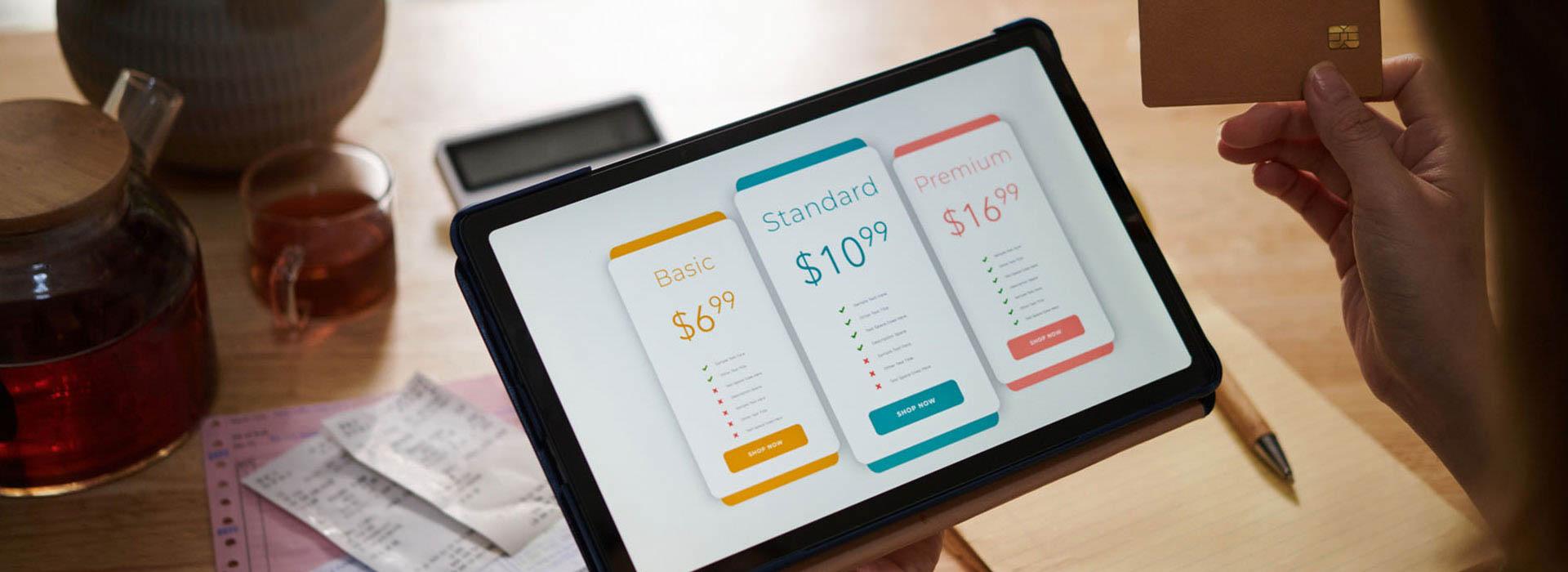
The benefits of automated recurring invoices
Discover how to automate recurring invoices with Worldpay and enhance your business efficiency.
Recurring invoices are increasingly being adopted by businesses in the UK. They support a business model that encourages customers to place regular orders for the same product or service.
They are typically issued on a weekly, monthly or quarterly basis, though the frequency can vary. Each invoice is identical except for the date, as the customer is receiving the same product or service with each payment.
These automated and pre-scheduled invoices streamline the payment process and help improve cash flow by ensuring a constant flow of funds.
Whereas traditional one-time invoices are created and sent manually for individual transactions, recurring invoices eliminate the need to chase future sales. This is why they are increasingly used. The global recurring payments market is projected by Juniper Research to reach $15 trillion by 2027.
The types of businesses that are driving the adoption of this sales model include:
- Subscription-based services
- SaaS (Software as a Service) companies
- Rental service providers
- Professional services
In this guide, we will show you precisely how you can benefit from setting up recurring invoices. We’ll walk you through how to use them and provide step-by-step setup instructions.
Read on to discover how you can improve your efficiency, ensure timely payments, create a predictable cash flow, and reduce your administrative workload.
Benefits of invoice automation
The growth of recurring invoicing as a business model is directly linked to the benefits it delivers to both businesses and their customers.
For customers, it offers a convenient way to regularly receive the services and products they love, without the need to manually order them each time. Scheduled payments mean they know exactly what they will be invoiced and when.
Recurring invoices benefit businesses in the following ways:
- Improved cash flow and forecasting: The steady stream of predictable income helps businesses achieve a more consistent cash flow. This predictability supports better budgeting and resource allocation.
- Time-saving benefits: Automated invoicing reduces the time spent on repetitive administrative tasks, like manually creating and issuing invoices.
- Reducing late payments and minimizing human error: It minimizes manual data entry errors and, by providing timely reminders to customers and automated ways to pay, it reduces late payments.
- Customer retention and satisfaction. Customers appreciate the simplicity and consistency of automated invoicing. This can improve retention rates and secure loyalty.
How to automate invoice processing to improve business efficiencies
Using Worldpay’s made-to-order payment optimization, it’s simple to automate recurring invoices to save time, reduce errors, and boost the efficiency of billing and payment collection.
For more information, refer to our small business guide to accepting recurring payments. Below, we’ve outlined the steps to set things up:
Step 1: Set up customer profiles
Input customer information, including their contact details, payment preferences, and billing frequency.
Step 2: Define invoice intervals and amounts
Set the frequency and amount for your invoices (e.g. weekly, monthly, quarterly).
Step 3: Enable automated notifications and reminders
Automate the sending of notifications to inform customers when the next invoice is due and when their payment is processed. This will minimize disputes and late payments.
Step 4: Customize invoices for branding
Worldpay makes it easy to ensure each invoice you send carries your branding. You can include your company’s logo, contact information, and personalized messaging on each invoice to enhance customer engagement.
Step 5: Review and monitor invoice processing
Worldpay IQ and reporting features make it easy to monitor payment statuses, identify overdue invoices, and spot trends for valuable business insights.
Common use cases for automatic invoicing
Here are some key sectors where automatic invoicing is particularly valuable.
- Subscription services: Industries such as streaming platforms, gyms, and digital content providers.
- SaaS (Software as a Service) companies: SaaS businesses offering monthly or annual subscriptions rely heavily on automatic invoicing to ensure customers receive consistent, on-demand service access.
- Legal and professional services: Professionals such as attorneys, consultants, and freelancers who operate on retainers or monthly fees use it to streamline their billing process.
- B2B services: Businesses offering ongoing B2B services, like marketing firms, equipment leasing companies, or IT service providers.
- Box services: Subscription boxes (e.g. meal kits, beauty products, and wellness boxes) use it to build loyalty.
- Property managers: Residential and commercial property managers ensure tenants pay consistently, minimizing late fees and disputes.
- Education and training services: Recurring tuition fees, course subscriptions, and memberships can benefit from the simplified payment collection.
- Maintenance and home services: Service providers for landscaping, cleaning, pest control, and HVAC maintenance can retain regular clients.
Automatic invoicing improves cash flow for these industries and offers their customers a streamlined payment experience, making it easier to maintain long-term business relationships.
To learn more about payment solutions tailored to modern B2B needs, explore our article on B2B solutions that simplify payment acceptance.
Tools and software for recurring invoices
Choosing the right software for automating recurring invoices will ensure you can manage payments efficiently. Here are some highly recommended tools for small businesses looking to streamline their billing processes:
- Worldpay's Commerce360: Commerce360 offers recurring billing, allowing you to set up automated invoicing and manage subscriptions easily. It integrates with other Worldpay solutions, offering a comprehensive payment processing suite.
- QuickBooks Online: Popular among small businesses for its invoicing and accounting features, QuickBooks integrates with various e-commerce and CRM tools, with plans for different sizes and types of business.
- Xero: Xero’s comprehensive range of invoicing tools includes automated billing. Well-suited for e-commerce businesses, it integrates with platforms like Shopify and Stripe.
- Zoho Invoice: Zoho Invoice provides automated invoicing that allows merchants to set up branded invoices. It integrates with the broader Zoho suite and has a free plan with basic features.
- Wave: This popular free invoicing and accounting tool allows small businesses to set up recurring billing at no additional cost. Though it offers limited integrations, it’s a great starter option for freelancers or very small businesses.
Best practices for automating your invoicing process
Ensuring your automated invoicing process is efficient and accurate requires implementing a few best practices. Here are some actionable tips to help:
- Ensure accuracy in recurring invoices: Double-check key details – like customer information, invoice amounts, and payment terms – before setting up automation. Regularly review and update customer data to keep billing information accurate over time.
- Personalize invoices: Customizing invoices with your brand logo, identity, and messaging makes your business appear more trustworthy, and your invoices easy to recognize.
- Set up automated payment reminders: To reduce late payments you can set up automated reminders at intervals leading up to the due date, as well as follow-up reminders if payment has not been made. You can also use automated notifications before each billing cycle to keep customers informed and build trust.
- Simplify payment options: Providing customers with multiple payment options, such as bank transfers, credit cards, or digital wallets, makes it easier for them to complete payments.
For more tips, explore our guide to 3 ways recurring payments can help businesses succeed.
Enhance your business operations with recurring invoices
Recurring invoices streamline your business processes, improve cash flow, minimize human error, and reduce the administrative burden of manual billing. They also enhance customer satisfaction and help you build customer loyalty.
Worldpay makes it simple to offer recurring invoices and fully leverage the benefits for your business.
If you are ready to enhance your business operations, explore the range of Worldpay solutions available to help you set up efficient, accurate, and secure recurring payments as you turbocharge your online payment processing.
Related Insights


